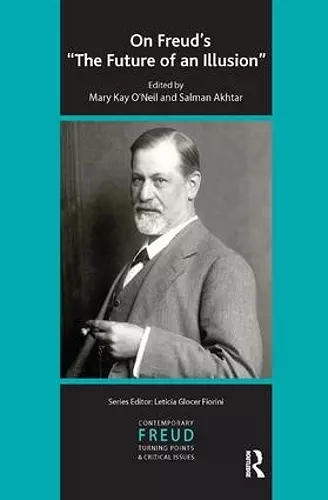On Freud's "The Future of an Illusion"
Salman Akhtar editor Mary Kay O'Neil editor
Format:Paperback
Publisher:Taylor & Francis Ltd
Published:31st Dec '09
Currently unavailable, and unfortunately no date known when it will be back
This paperback is available in another edition too:
- Hardback£125.00(9780367106164)

"The Future of an Illusion" reveals Freud's reflections about religion as well as his hope that in the future science will go beyond religion, and reason will replace faith in God. The discussion with an imaginary critic revealed his internal debate, mirroring the debate about this subject in the outside world. However, it also enlightens his way of thinking: deconstructing and constructing at the same time. This volume considers Freudian ideas and their implications today, while focusing on the contradictions and gaps in Freud's proposals. The question of the coexistence between religion and psychoanalysis, as well as the place of ideals, belief, illusion, and imagination - and, no less important, the benevolent and destructive aspects of religion - also come into play.
'This is a most welcome, and overdue, rich contribution to what Freud dared to address in response to Romain Rolland's question to him, that he, the disbeliever, explain the nature of the widely experienced "oceanic feeling". The contributors to this volume accept fairly readily Freud's cogent psychoanalytic explanation that the origins of religion lie in what today we would explain as the symbiotic (therefore, 'oceanic') experience of earliest childhood and in the face of existential anxiety to wish to return to a state of "being one with the beyond". But in complement, the contributors variably take Freud's view of religion as the neurosis of society to task. This is strong scholarship, admirable thinking, some even brilliant, meaningful reading, and re-opens of the question, "Must one choose between psychoanalysis and religion, or can one be psychically healthy and engage in both?"'- Henri Parens, M.D.'Sigmund Freud, by the very act of making God a subject of metapsychological deconstruction, took a resolutely atheistic position. His pupils and followers also adhered "religiously" to the arguments and declarations he made in "The Future of Illusion" and later in "Civilization and Its Discontents". Scientific positivism of the early twentieth century provided a receptive crucible for Freud's debunking of God. He had given voice to what was brewing in the minds of the Western intelligentsia. The unspeakable atrocities that soon followed in the name of religious nationalism in Europe "confirmed" that ethnocentrism and its conceptual twin, religious belief, were dangerous commodities.They led to intoxication with in-group superiority and laid the groundwork for oppression of "others", and even cruelty and genocide. Early European psychoanalysts, themselves the victims of prejudice and violence, wholeheartedly followed the ray of hope offered by Freud's declaration that religion was a hoax and science will sooner or later assure that rationality prevails in the conduct of interpersonal and communal affairs. At that point atheism and psychoanalysis became inseparable.'- Salman Akhtar
ISBN: 9781855756274
Dimensions: unknown
Weight: unknown
318 pages